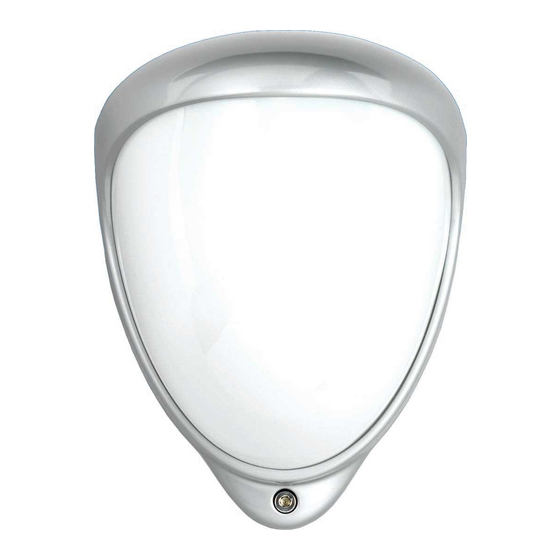
Advertisement
Quick Links
D-TECT 1 HT
GJD 112 High Humidity PIR Movement Detector
PACKAGE CONTENTS
Package Contains:
• 1 x D-Tect 1 HT
• 1 x Drilling template for fixing holes
• 3 x 31.75mm wall plugs
• 3 x 31.75mm screws
• 2 x Spare Sliding Curtains
• 2 x Tamper Feet
• 1 x Installation manual
INTRODUCTION
The D-Tect 1 is an outdoor motion detector and alarm
trigger the D-Tect1 delivers precise, reliable presence detection.
QUICK INST ALLA TION
1.
Mount and connect the detector following the instructions
given later in this sheet.
2.
Apply supply voltage to the unit. The detection LED
(blue) flashes three times.
3.
Wait approximately 2 to 3 minutes to allow the detector
to settle.
Note: The front cover must be fitted when walk testing.
The default settings are:
• Range: 20 meters
• Pulse count: 1
• Detection LED: off
MOUNTING THE UNIT
WARNING
• NYLON WASHERS PROVIDED MUST BE USED WITH SCREWS
• ENSURE CABLE ENTRY AND SCREW HOLES ARE
SEALED WITH WATER BASED SEALANT
• DO NOT USE SILICONE BASED SEALANT
During installation, protect the electronics against water, as
trapped moisture can affect or damage the unit.
1. Drill the wall to accept the two fixing screws, the cable entry,
and the tamper cup (if used). See Figures 1 and 2.
A hole-drilling template is provided.
Note: We recommend using the tamper cup on uneven wall
surfaces.
2. Remove the cover assembly by loosening the locking screw
using the allen key provided. The cover hinges from the top and
lifts out of the location slot. See Figure 3.
3. Feed standard eight-core alarm cable into the cable entry.
Bare the wires and connect 6 wires to the terminal block and
optionally connect 2 to the tamper board. See Figures 2, 4, 5,
6 & 7.
4. Screw the unit to the wall ensuring that the tamper pin is
correctly located and that the tamper microswitch is closed.
See Figure 7.
To aid installation, two spare tamper feet are provided. One
is 1mm longer and the other is 2mm longer than the tamper
foot originally fitted. The tamper foot is a push fit and can be
removed by carefully pulling it from the pin. See Figure 2.
5. When the detector is aligned, connected, and programmed to
suit the installation, replace the front cover and lock as shown.
See Figure 8.
MUL TIBEAM ALIGNMENT & MASKING
The multifunction lens fitted to D-Tect 1 produces seven
long range beams and seven medium to short range curtain
PIR beams. The PIR circuitry detects changes in heat and
movement in the beam pattern; therefore items such as
trees, shrubs, ponds, boiler flues, and animals should be
considered when positioning the detector.
Note: The PIR sensor is more sensitive to movement across
the beams, and less sensitive to movement directly towards or
away from the beams.
The detector module is fitted with two sliding shutters to reduce
the detection angle.
The curtains are fitted to the pan and tilt module as shown in
Figure 9 (shown with primary and additional curtain sliders
fitted). Each section of the detector lens gives a coverage
pattern of approximately 10 degrees.
An additional set of curtain sliders is provided should the beam
pattern need to be narrowed even further, e.g. if the minimum
detection angle of 10 degrees is required.
When coverage exceeds the desired detection area, adjust
the module as required and mask off any beams, either
vertically or horizontally, to avoid unwanted detection.
Use portions of the self-adhesive silver mask applied to the
rear, smooth side of the lens as shown in Figures 10 to 11.
Always replace the lens the correct way up to ensure exact
beam pattern coverage (top of the lens is marked TOP).
When mounted at heights above 3 metres there could be a
significant reduction in the range of detection and the target
will have to move a greater distance within the field of view
before an alarm is generated.
Configuration
Multibeam
(Optimum)
Pet Immunity*
* Black area should be masked for pet alley applications up to 20m
-1-
Mounting
Tilt (º)
Max.
Height
Range
(m)
(m)
3
0
20
1.5
-2
20
Reference
Figure 10
Figure 11
Advertisement

Subscribe to Our Youtube Channel
Summary of Contents for GJD D-TECT 1 HT
- Page 1 D-TECT 1 HT GJD 112 High Humidity PIR Movement Detector PACKAGE CONTENTS 3. Feed standard eight-core alarm cable into the cable entry. Package Contains: Bare the wires and connect 6 wires to the terminal block and • 1 x D-Tect 1 HT optionally connect 2 to the tamper board.
-
Page 2: Specifications
Figure 12 shows the pattern for the maximum range in the ACCESSORIES optimum position (see Figure 10). GJD is able to supply the following accessories to aid Figure 13 shows the pattern for the minimum range (10m). installation: Figures 14 and 15 illustrates alignment recommendations for GJD304 Conduit cable entry adaptor ring when the detector is mounted close to a wall. - Page 4 Switches...
- Page 5 Engineer Notes Technical: 01706 363990 Sales: 01706 363998 Fax: 01706 363991 Email: info@gjd.co.uk Unit 2, Birch Business Park, Whittle,Lane,Heywood,OL10 2SX...
















Need help?
Do you have a question about the D-TECT 1 HT and is the answer not in the manual?
Questions and answers